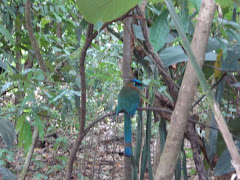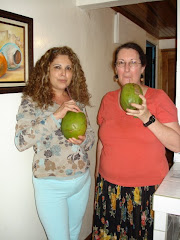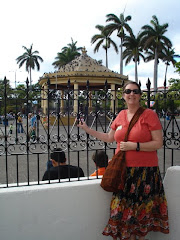

Saturday, 4 Abril 2009: As we rumble down the road toward Granada, Nicaragua, a large volcano appears in the haze on the righthand side, then a lake with waves lapping the shore, then a line of very large white wind turbines—quite a tableau of welcome (see video below). Along the way we see lots of trash on the side of the road—as in Costa Rica—concrete block houses with no doors and decorative blocks inset as windows, wash on the line; goats, cows, horses, pigs, and all kinds of fowl grazing—sometimes on ropes—on the grassy shoulders; herds of Brahmin cattle; repainted US school buses with bags and bicycles on top (the infamous “chicken buses” of Latin America—but not seen in CR); horse-pulled wooden carts with families returning from the market or farms; countless roadside stands with fruits, gourds, and veggies; houses painted the colors we’ve become used to: the greens and blues of nature, but also bright vibrant colors of melons—watermelon, cantaloupe, mango, papaya—beautiful reds, corals, yellows, and oranges. Most of the houses are small and simple, but clean and colorful, and without the gates and barbed wire of Costa Rica, while others are nothing more than stacked tin and wood with dirt floors. The primary mode of transportation is the bicycle, whose riders carry extra passengers, bags of groceries, or a briefcase.
Today as we were waiting in line at the border, I learned from some students that chemistry professor Gene Gooch was killed on Friday, April 3, while he was riding his bicycle near campus. This news arrives at the end of a long week, when we learned of the passing of an Elon freshman who was in the same sorority as some of my CR students, and the loss of a Winter Term CR student’s father in a fishing accident over break. My mind and heart go out to the Elon community and to Chaplain Richard McBride, who is in his last semester before retirement—a time which should be filled with happy reminders of a remarkable career, yet here he is, brought back to the duties at hand, of comforting the community, the families, and of trying to explain the bizarre workings of life.
And tonight, finally, we are in Granada, enjoying a very beautiful, Spanish colonial style hotel. As soon as the bus pulled in front of the hotel and we wearily stepped off, several young boys began begging us for anything we might be able to give them—chips, fruit, leftover sandwiches, or a Córdoba or 2. Now, I’m listening to my students playing in the pool near my room. “Be thankful!”I want to shout. That your family has shelter with walls, doors, and windows; a washer and dryer; a car to drive and bicycles for recreation—horses, too, perhaps. That you don’t have to take a cart home in the evening or drive a three-wheeled taxi for your livelihood. That you and your siblings don’t have to beg tourists at hotels and restaurants for money and food. I wish I could say that the people we saw today looked happy, content, but I cannot. They looked beaten-down, hungry, desperate. The young boys who begged for food were young, 6 or 8, yet were experts at what they have been taught to do. How are we living here? How are they living here?















































































































No comments:
Post a Comment